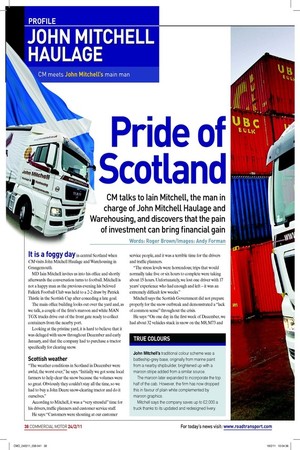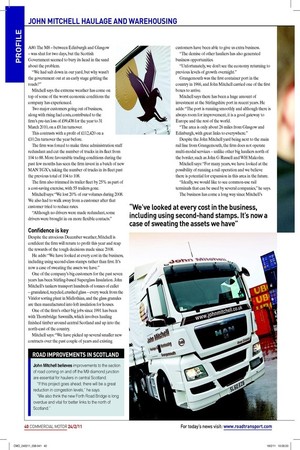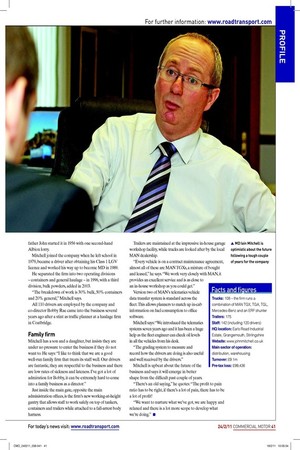Pride of Scotland
Page 30

Page 32

Page 33

If you've noticed an error in this article please click here to report it so we can fix it.
CM talks to Iain Mitchell, the man in charge of John Mitchell Haulage and Warehousing, and discovers that the pain of investment can bring financial gain
Words: Roger Brown/Images: Andy Forman It is a foggy day in central Scotland when
CM visits John Mitchell Haulage and Warehousing in Grangemouth.
MD Iain Mitchell invites us into his ofice and shortly afterwards the conversation turns to football. Mitchell is not a happy man as the previous evening his beloved Falkirk Football Club was held to a 2-2 draw by Patrick Thistle in the Scottish Cup after conceding a late goal.
The main ofice building looks out over the yard and, as we talk, a couple of the irm’s maroon and white MAN TGX trucks drive out of the front gate ready to collect containers from the nearby port.
Looking at the pristine yard, it is hard to believe that it was deluged with snow throughout December and early January, and that the company had to purchase a tractor speciically for clearing snow.
Scottish weather
“The weather conditions in Scotland in December were awful, the worst ever,” he says. “Initially we got some local farmers to help clear the snow because the volumes were so great. Obviously they couldn’t stay all the time, so we had to buy a John Deere snow-clearing tractor and do it ourselves.” According to Mitchell, it was a “very stressful” time for his drivers, trafic planners and customer service staff. He says: “Customers were shouting at our customer service people, and it was a terrible time for the drivers and trafic planners.
“The stress levels were horrendous; trips that would normally take ive or six hours to complete were taking about 15 hours. Unfortunately, we lost one driver with 17 years’ experience who had enough and left – it was an extremely dificult few weeks.” Mitchell says the Scottish Government did not prepare properly for the snow outbreak and demonstrated a “lack of common sense” throughout the crisis.
He says: “On one day in the irst week of December, we had about 32 vehicles stuck in snow on the M8, M73 and A80. The M8 – between Edinburgh and Glasgow – was shut for two days, but the Scottish Government seemed to bury its head in the sand about the problem.
“We had salt down in our yard, but why wasn’t the government out at an early stage gritting the roads?” Mitchell says the extreme weather has come on top of some of the worst economic conditions the company has experienced.
Two major customers going out of business, along with rising fuel costs, contributed to the irm’s pre-tax loss of £99,438 for the year to 31 March 2010, on a £9.1m turnover.
This contrasts with a proit of £112,420 on a £10.2m turnover the year before.
The irm was forced to make three administration staff redundant and cut the number of trucks in its leet from 104 to 88. More favourable trading conditions during the past few months has seen the irm invest in a batch of new MAN TGX’s, taking the number of trucks in its leet past the previous total of 104 to 108.
The irm also trimmed its trailer leet by 25% as part of a cost-saving exercise, with 55 trailers gone.
Mitchell says: “We lost 20% of our volumes during 2008.
We also had to walk away from a customer after that customer tried to reduce rates.
“Although no drivers were made redundant, some drivers were brought in on more lexible contacts.”
Confidence is key
Despite the atrocious December weather, Mitchell is conident the irm will return to proit this year and reap the rewards of the tough decisions made since 2008.
He adds: “We have looked at every cost in the business, including using second-class stamps rather than irst. It’s now a case of sweating the assets we have.” One of the company’s big customers for the past seven years has been Stirling-based Superglass Insulation. John Mitchell’s tankers transport hundreds of tonnes of cullet – granulated, recycled, crushed glass – every week from the Viridor sorting plant in Midlothian, and the glass granules are then manufactured into loft insulation for houses.
One of the irm’s other big jobs since 1991 has been with Thornbridge Sawmills, which involves hauling inished timber around central Scotland and up into the north-east of the country.
Mitchell says: “We have picked up several smaller new contracts over the past couple of years and existing
ROAD IMPROVEMENTS IN SCOTLAND
John Mitchell believes improvements to the section of road coming on and off the M9 diamond junction are essential for hauliers in central Scotland.
“If this project goes ahead, there will be a great reduction in congestion levels,” he says.
“We also think the new Forth Road Bridge is long overdue and vital for better links to the north of Scotland.” customers have been able to give us extra business. “The demise of other hauliers has also generated business opportunities.
“Unfortunately, we don’t see the economy returning to previous levels of growth overnight.” Grangemouth was the irst container port in the country in 1966, and John Mitchell carried one of the irst boxes to arrive.
Mitchell says there has been a huge amount of investment at the Stirlingshire port in recent years. He adds: “The port is running smoothly and although there is always room for improvement, it is a good gateway to Europe and the rest of the world.
“The area is only about 26 miles from Glasgow and Edinburgh, with great links to everywhere.” Despite the John Mitchell yard being next to the main rail line from Grangemouth, the irm does not operate multi-modal services – unlike other big hauliers north of the border, such as John G Russell and WH Malcolm.
Mitchell says: “For many years, we have looked at the possibility of running a rail operation and we believe there is potential for expansion in this area in the future.
“Ideally, we would like to see common-use rail terminals that can be used by several companies,” he says.
The business has come a long way since Mitchell’s father John started it in 1956 with one second-hand Albion lorry.
Mitchell joined the company when he left school in 1979, became a driver after obtaining his Class 1 LGV licence and worked his way up to become MD in 1989.
He separated the irm into two operating divisions – containers and general haulage – in 1996, with a third division, bulk powders, added in 2003.
“The breakdown of work is 30% bulk, 50% containers and 20% general,” Mitchell says.
All 110 drivers are employed by the company and co-director Bobby Rae came into the business several years ago after a stint as trafic planner at a haulage irm in Coatbridge.
Family firm
Mitchell has a son and a daughter, but insists they are under no pressure to enter the business if they do not want to. He says: “I like to think that we are a good well-run family irm that treats its staff well. Our drivers are fantastic, they are respectful to the business and there are low rates of sickness and lateness. I’ve got a lot of admiration for Bobby, it can be extremely hard to come into a family business as a director.” Just inside the main gate, opposite the main administration ofices, is the irm’s new working-at-height gantry that allows staff to work safely on top of tankers, containers and trailers while attached to a fall-arrest body harness. Trailers are maintained at the impressive in-house garage workshop facility, while trucks are looked after by the local MAN dealership.
“Every vehicle is on a contract maintenance agreement, almost all of these are MAN TGXs, a mixture of bought and leased,” he says. “We work very closely with MAN, it provides an excellent service and is as close to an in-house workshop as you could get.” Version two of MAN’s telematics vehicle data transfer system is standard across the leet. This allows planners to match up in-cab information on fuel consumption to ofice software.
Mitchell says: “We introduced the telematics systems seven years ago and it has been a huge help as the leet engineer can check oil levels in all the vehicles from his desk.
“The grading system to measure and record how the drivers are doing is also useful and well received by the drivers.” Mitchell is upbeat about the future of the business and says it will emerge in better shape from the dificult past couple of years.
“There’s an old saying,” he quotes: “The proit to pain ratio has to be right, if there’s a lot of pain, there has to be a lot of proit!
“We want to nurture what we’ve got, we are happy and relaxed and there is a lot more scope to develop what we’re doing.” ■











































